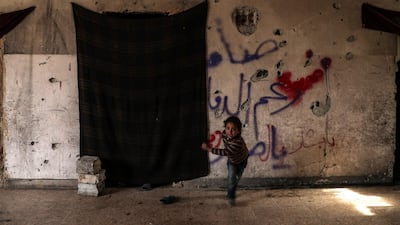Syrian army forces supported by Iranian-backed militias pushed deeper into the last rebel-held enclave near a border area with Israel and Lebanon.
Troops advanced east and south of the rebel-held bastion of Beit Jin, backed by some of the heaviest aerial bombing and artillery shelling since a major assault began more than two months ago to seize the area, rebels said.
The Syrian army said it had encircled the village of Mughr Al Meer at the foothills of Mount Hermon as troops moved towards Beit Jin, encountering fierce resistance.
The enclave is the last rebel bastion left in the area south west of Damascus known as Western Ghouta that had since last year fallen under government control after months of heavy bombing on civilian areas and years of siege tactics that forced rebels to surrender.
A western intelligence source confirmed rebel reports that Iranian-backed militias, including the Lebanese Hizbollah group, were playing a major role.
"The Iranian-backed militias are trying to consolidate their sphere of influence all the way from southwest of Damascus to the Israeli border," said Suhaib Al Ruhail, an official from the Liwa Al Furqan, a rebel group in the area.
Read more: Syrian spend yet another Christmas trapped in Assad's nightmare
Worried by Iran's expanding influence in Syria after the defeat of ISIL, Israel has in the last few weeks stepped up its strikes against suspected Iranian targets inside Syria.
Early this month, an Israeli attack on a base near Kiswah, south of Damascus was believed to be an Iranian military compound, according to a western intelligence source
Israel has been lobbying both big powers to deny Iran, Hizbollah and other militias any permanent bases in Syria, and to keep them away from the Golan, as they gain ground while helping Damascus beat back rebels.
The southwest of Syria is part of a de-escalation zone in southern Syria agreed last July between Russia and Washington, the first such understanding between the two powers.
The area has not been bombed by Russia, unlike other ceasefire areas in Syria.
Read more: Syria year in review — Assad fixes his place as outside powers pursue their agendas
Diplomatic sources said several thousand fighters who have been amassing from outside the Quneitra province are pitted against hundreds of Islamist and mainstream Free Syria Army (FSA) rebels closing ranks under the banner of Itihad Quwt Jabal Al Sheikh - Union of fighters of Jabal al Sheikh". They are mainly drawn from fighters from the area.
With the army and Iranian-backed offensive widening, the rebels have called on youths to enlist while imams in Beit Jin called on people to take up arms and fight the army.
Rebels still have a sizeable presence in central and southern Quneitra, in the Syrian Golan Heights.
Western diplomatic sources said the crushing of the Sunni rebel presence in areas they have been in since 2013 will allow Hizbollah to open another secure arms supply line from its border in southern Lebanon into Syria.
Since the beginning of the conflict in Syria, Iran has had a growing presence in the country, deploying thousands of Shiite fighters who have fought against both mainstream Sunni rebel groups and more militant groups.

